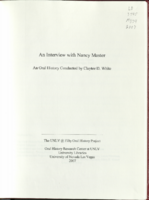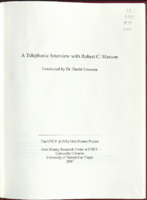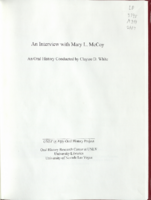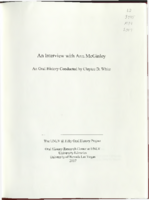Search the Special Collections and Archives Portal
Search Results

Transcript of interview with Colleen Gregory by Tim Waters, April 6 & 7, 1976
Date
Archival Collection
Description
On April 6 and 7, 1976, Tim Waters interviewed Colleen Gregory (born 1928 in Santa Clara, Utah) about her life in Southern Nevada. Gregory first talks about her original move to Las Vegas, her early education, school activities, and her college education. She also talks about the first banks, Helldorado, the atomic testing, and environmental changes. Other topics covered include Howard Hughes, Western-style influences, first properties on the Strip, World War II, racial prejudice, and changes she has noticed during her career in banking.
Text

Transcript of interview with Edward Gregory by Jonathan Bellingar, March 2, 1977
Date
Archival Collection
Description
On March 2, 1977, Jonathan R. Bellingar interviewed Edward Gregory (born July 28, 1922) about his life in Nevada. The interview takes place at Nellis Air force Base; also present during the interview is an unidentified man. Gregory was born and raised in Nevada; he discusses leaving Nevada to serve in the Army during World War II before eventually returning to Nevada in 1950. The interview concludes with a brief overview of how Nellis Air force Base has changed since the 1950s.
Text

Transcript of interview with Celia Rivero Grenfell by Patricia Hollard, March 31, 1977
Date
Archival Collection
Description
On March 31, 1977, Patricia Holland interviewed Celia Rivero Grenfell (born 1926 in Las Vegas, Nevada) about her life in Southern Nevada. Grenfell first talks about her family background in Mexico and later describes her family’s restaurant business. She also describes her education, recreational activities, Downtown Las Vegas, and Helldorado. The two also discuss racial segregation and prejudice, the El Rancho Vegas, Lorenzi Park, early churches, environmental changes, early air conditioning, and Grenfell’s early work in a laundry business.
Text

Transcript of interview with Bertha Gresh by James M. Green, November 1, 1974
Date
Archival Collection
Description
On November 1, 1974, collector James M. Greene, interviewed widow and mine leaser, Bertha Gresh (born August 29th, 1883, in Cedarburg, Wisconsin) in her home in Nelson, Nevada. This interview covers early mining days, Bertha’s personal history, and the history of Nelson County. She also discusses her art, social activities, and the prizes she won as a visual artist in Nevada.
Text

Transcript of interview with Theda Kay Grinnell by Fletcher Corey, February 28, 1977
Date
Archival Collection
Description
On February 28, 1977, Fletcher Corey interviewed Theda Kay Grinnell (born 1935 in New London, Iowa) about her life in Las Vegas, Nevada. Grinnell first talks about her move to Nevada and both her and her husband’s work at the Nevada Test Site. She also talks about the atomic blasts, competition with Russia, and her employment that followed her work at the Test Site. Grinnell later talks about her church membership and goes into detail about the race riots and how they involved and impacted her and her son. The end of the interview includes discussion on flash floods, the culinary union, how World War II affected the Las Vegas industry, and the social changes in Las Vegas.
Text

Transcript of interview with Laura Gunning by Mike Martinez, March 5, 1981
Date
Archival Collection
Description
On March 5, 1981, Mike Martinez interviewed Laura Gunning (born 1923 in Los Angeles, California) about her life in Las Vegas, Nevada. Gunning first talks about her family background, her church membership, education, and the minimum wage. She also talks about the Las Vegas Strip, the first businesses and markets in Las Vegas, change in climate, and family trips.
Text

Transcript of interview with Nancy Master by Claytee D. White, July 14, 2006
Date
Archival Collection
Description
Text

Transcript of interview with Robert C. Maxson by Dr. David Emerson, May 15, 2007
Date
Archival Collection
Description
Text

Transcript of interview with Mary L. McCoy by Claytee D. White, February 26, 2009
Date
Archival Collection
Description
Text

Transcript of interview with Ann McGinley by Claytee D. White, August 01, 2006
Date
Archival Collection
Description
Text
